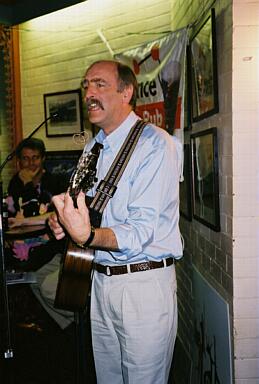|
|
Celestial considerations: stardust, sunspots and
solar storms
With panelists Robert Walsh, Fred Watson and John Sarkissian and compere Paul Willis Tuesday,February 20th 2001, 7:00-9:00pm Science in the Pub™ visits Parkes to take a look at Celestial considerations: stardust, sunspots and solar storms with astronomers Dr Robert Walsh, Research Fellow in the Solar Theory Group at the University of St. Andrews in the UK, Dr Fred Watson, Astronomer-in-Charge of the Anglo-Australian Observatory near Coonabarabran and Dr John Sarkissian, Operations Scientist at the Parkes Radio Observatory. Enjoy their cosmic collaboration under the baton of our titillating compere, Dr Paul Willis, ABC science reporter and palaeontologist. You will learn about solar flares and sunspots, what makes a radio telescope tick and lots about the motions of stars and galaxies. You might even be lucky enough to be serenaded by the famous Fred as he croons his cosmic compositions as he accompanies himself by guitar. This session is a special feature brought to you by ABC Science, Science in the Pub, the British Council and CSIRO's Parkes Telescope.
Robert Walsh is a solar astrophysicist and expert in space-based observations of the Sun and theoretical modelling of the solar environment. He is currently a PPARC Research Fellow in Solar Physics within the Solar Theory Group at the University of St. Andrews. Last year Robert won the Royal Institution of Great Britain, Scientists for the New Century Millennium Lecture Series. He is dedicated to the Public Understanding of Science and through them Robert is working on a project which aims to produce an educational CD ROM about the next UK Solar Eclipse. The project is called Sun Block '99 involves young scientists investigating the Sun. John Sarkissian is an Operations Scientist at the Parkes Radio Observatory. His main responsibilities are the operation and systems development at the radio telescope, and the support of visiting astronomers with their observations. He supplied background research for the production of the film The Dish. John's current projects include the development of software to characterise Radio Frequency Interference (RFI) at all the ATNF observatory sites; the timing of a bright southern millisecond pulsar that will allow independent tests of General Relativity, and the timing of young pulsars. He is also an Associate Member of the SETI (Search for Extraterrestrial Intelligence) Australia Centre. John originally came to Parkes to manage the spacecraft tracking operations for the Galileo Mission to Jupiter. F red Watson comes from a long line of Freds, but seems to be the first one to have become an astronomer. Born and raised in England’s north-country, he was educated in Scotland, gaining his doctorate at the University of Edinburgh. He has worked at both of Britain’s Royal Observatories, and has observed with large telescopes in Hawaii and the Canary Islands. In Australia, during the 1980s, he helped to pioneer the use of fibre optics in astronomy. Fred is now Astronomer-in-Charge of the Anglo-Australian Observatory near Coonabarabran, where he is responsible for the scientific output of the Anglo-Australian and UK Schmidt Telescopes. Fred’s own scientific interests are in the motions of stars and galaxies, and in the development of new instrumentation for astronomy. When time permits, he also carries out research on the history of optical instruments. He does the odd bit of writing and broadcasting and, like many astronomers, spends a lot of time wondering what the Universe is for (and why it is in such a mess). Fred’s activities outside work centre on his family and his passion for music.
...and true to the Science in the Pub tradition, our astronomers offer their 'abstracts' in verse! A Personal Ode to a Big Ball of Gas Our planet revolves round a star called the Sun This huge sphere of gas is one hundred Earths wide Now we're at a time that is called Solar Max You may think this cycle is all very well
So next time you put on the shades and sun-cream The Ballad of the Dish and the Moon A man called Cec Moon was once mayor in Parkes It was known all round that Parkes was the place Day and night now, four decades on Then, one day, down swooped the Working Dog team Now the dish of the stars is the star of ‘The Dish’. Forbidden Lines The Universe, a largish place, Here, atoms, free from earthly pressure, Back on Earth, it took a while An unknown substance, it was deemed, Then, in nineteen-twenty-eight, "Forbidden lines, you see, become "How brilliant!", his peers exclaimed, And, in the folklore of the sky, Reference: I. S. Bowen, Astrophysical Journal, 67, 1-15, 1928
Science in the Pub™ is the Eureka award winning initiative of the Australian Science Communicators (NSW). Regular sessions are staged from 7.00-9.00 pm on the last Wednesday of the month (February to November) at the Harlequin Inn, 152 Harris Street, Pyrmont in Sydney. Admission costs $5 worth of raffle tickets, your chance to win one of many excellent prizes! We can organise Science in YOUR Pub anywhere in Australia, or the world! Please contact Robyn Stutchbury, phone: 02 9427 6747; fax: 02 9427 6767; email: Robyn Stutchbury on rstutch@bigpond.net.au. Visit our website at http://www.scienceinthepub.com/.
Future Science in the Pub sessions (see the website for full details):
|
||||||||||||||
|
|
|||||||||||||||



